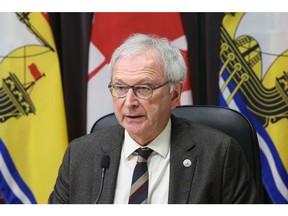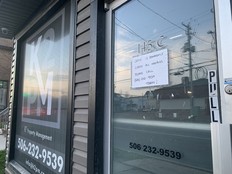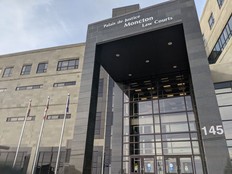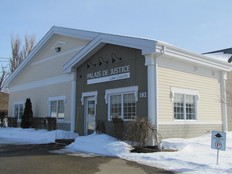New law will help address homelessness problems: Higgs
'This Act will recognize the reality that, when people’s lives are in danger, we can help them find shelter so that they will not die, they will not pass away, or they will not freeze'

Article content
The Tories say they’ll follow through on a fall promise to create a new law that could force homeless people into addiction treatment.
The comments, from Premier Blaine Higgs in the legislature on Tuesday, came in the wake of the deaths of two people at one of the tent encampments in Saint John on Monday.
At least four unhoused people have died in New Brunswick in the last few months.
Facing sustained questioning from the Liberals, and what “concrete plans” the government has to address New Brunswick’s growing number of homeless people, Higgs said it’s “not right .. to have people walk by and try to encourage someone to come into a shelter on a freezing night knowing that, if they stay there, they are at risk, high risk.”
“Yet, we have been doing it for some time, not only recently but also for many years. That’s why, in this session, we will be bringing forward a Compassionate Intervention Act. This Act will recognize the reality that, when people’s lives are in danger, we can help them find shelter so that they will not die, they will not pass away, or they will not freeze.”
No other new details about the law were provided.
On Wednesday, Public Safety Minister Kris Austin said there’s “nothing” in the new law about forcing homeless people to go to a shelter, and that it’s strictly about homeless people with addiction problems getting help.
Higgs “knows that,” Austin said.
Questioned by reporters on Tuesday, Higgs was asked whether the moves he’s talking about would be legal. He replied that “that’s where the debate will come in, when we introduce (the new law).”
Pressed on whether he’s seen a similar law in any other jurisdiction, Higgs said he didn’t know. He agreed that housing homeless people is another key part of the government’s strategy, but noted that finding affordable housing is a big challenge.
“I think we are at a crossroads here, trying to figure out how do we save people, from themselves in some cases?” he said. “How do we find ways where we’re not just building more tent cities, but we’re actually finding a long-term vision for what people need?”
He later added that “if people need help because they aren’t able to help themselves, we need to find a way to deal with that.”
Liberal Leader Susan Holt said she won’t support a law that allows people with addiction issues to be forcibly removed from the streets, and that there are solutions, but that the government doesn’t want to consider them.
As examples, she pointed to Nova Scotia, which is supplying Arctic tents with heating capacity. Holt also noted Miramichi’s recent move to provide trailers for homeless people, which provide a “private,” safe space.
“I think the premier is out of touch with what’s happening in communities right now, and the best ways to help New Brunswickers,” she said. “We have the minister of mental health talking about the need for community supports and treatment options, and we have the premier and the minister of public safety saying we should put people in jail.”
That was a reference to a comment Austin made during question period, who vowed that the Tories will be “tough on crime and tough on rehabilitation.”
Holt and Green party Leader David Coon both said they’ve both been told that some people are reluctant to go into shelters because they fear for their safety, and that their belongings will be stolen.
The Tories’ proposal is “crazy” and “problematic,” Coon said.
“There’s already legislation where people who are a danger to themselves or others to be … taken off the streets,” Coon said. “We’ll see what the bill says, but the way it’s being presented, it sounds like it goes way too far. And it’s not going to solve problems.”
The real issue, he said, is “high rents, unaffordable rents, and the lack of appropriate housing for people who end up on the streets, and the services that need to go with that housing.”
While speaking to reporters on Wednesday, Austin said that “there’s a very strong connection” between homelessness and addictions, and that “most” people who “are involved in extreme addictions” “don’t know their own name,” and are “incoherent most of the time.”
Asked how he reached those conclusions, Austin asked: “Where are you living? Where have you been?”
“Go walk down the main street of Fredericton. Go talk to the homeless people that are out there. Go to Moncton. Go to any city in North America. This is clear, and if you can’t see that, I don’t know what to tell you.”
Holt, who overheard the exchange, said Austin’s comments were “really hard to listen to … the way he spoke down about people who are struggling with addictions.”
“And then when he pointed out the fact that the premier was confused about the connection between the (new) Act and people who are out in the cold, (that) suggests exactly what we know: that the government doesn’t have any solutions for people who are out in the cold right now, and they’re grasping at straws and conflating issues where they shouldn’t be.”












Postmedia is committed to maintaining a lively but civil forum for discussion. Please keep comments relevant and respectful. Comments may take up to an hour to appear on the site. You will receive an email if there is a reply to your comment, an update to a thread you follow or if a user you follow comments. Visit our Community Guidelines for more information.